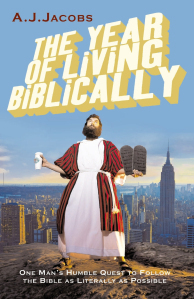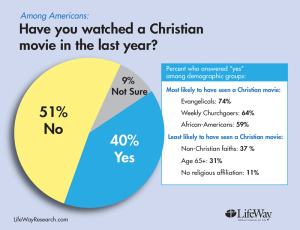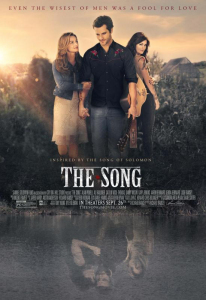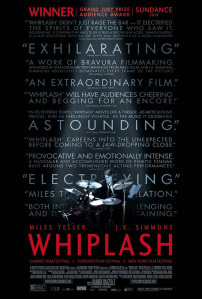Nate Fleming's Blog, page 30
March 14, 2015
It Almost Begins… 40 Days (and Nights) of Christian Media
I just posted this on Facebook:
Here I am, 10 minutes away from the start of my 40 days of Christian Media, and I’m starting to feel nervous.
This is going to be a long 40 days.
And after spending Saturday preparing for the next forty days, scouring the internet for Christian media that I think I could consume and not feel physically ill, I’m seriously concerned about what will happen over the next month and 10.
I have subscribed to Christian Faithbook – the Christian equivalent to Facebook.
I have subscribed to Godinterest – the Christian equivalent to Pinterest.
I have subscribed to Parables.tv – the Christian equivalent to Netflix.
I have subscribed to every podcast hosted by Christians that I think sounds the least bit interesting to a person who loves film, creativity, the arts, humor, and culture.
I have cleansed my iPod of all secular music and podcasts.
I spent the last hour before the challenge began watching the last episode of The Flash – one of my favorite television programs currently being broadcast. ��I’m seriously bummed that I’m going to miss the premiere of the new season of Community, which starts in just a few days. ��I’m not at all sure what I will watch during lunch, since I’m used to watching old episodes of The Office, Community, and Parks and Recreation.
And I’m spending my time leading up to midnight listening to Hans Zimmer’s Interstellar score, the soundtrack – the music – that I’m going to miss the most over the next forty days.
I plan to wake up tomorrow and start my day with Skye Jithani’s With God daily devotional, and do so for the next forty days.
And it’s now 12:01 AM (China time). ��The 40 Days (and Nights) Christian Media Challenge has begun.
See you on the other side!
Nate

March 12, 2015
40 Days (and Nights) of Christian Media ��� The Challenge

Media cloud, VLADGRIN / Shutterstock.com
I have a confession to make: ��I am a Christian, and I dislike Christian media.
To clarify, I don’t dislike all Christian media, just most Christian media. ��I will – on occasion – listen to a praise and worship playlist on Spotify; every now and then a Christian-made film will surprise me as an enjoyable film-viewing experience; there are a handful of Christian writers who capture me with everything they write. ��I don’t visit many Christian websites, and I don’t listen to many Christian podcasts. ��By and large, I am creatively and artistically unimpressed with much that comes out of the world of Christian media.
But it runs deeper than that. ��While I don’t have a problem with the individuals creating the media, I don’t like the various industries that have built up around the Christian faith. ��For example, on this blog I’ve argued against the creation of a Christian film industry. ��In the spirit of Keith Green and Rich Mullins, I’m vexed��that writing praise and worship songs and devotional books is a big business. ��I’m most definitely��not a fan of the idea of Christian celebrity, because��celebrity runs counter to the humble life that Jesus lived, which is the point of the Christian faith.
And don’t get me started on people using Christianity to get ahead in politics.
I haven’t always felt this way. ��I think it started when I��moved out��of��the Christian subculture in 1999, the year I moved to Kazakhstan. ��Also, as I’ve grown older, I’ve become more discerning with both my theology and my artistic tastes. ��Finally, I credit the internet, which opened the door to everyone and their mother creating media��with their cell phones and laptops, which means that a LOT��of the Christian (and not Christian) media being produced is just… for the lack of a better word… poopy.
A few days ago, Lifeway Research published a report that showed that the majority of Christian media is consumed by Christians. ��This��means��that I – as a middle-aged white Christian male – represent one of the��key demographics for Christian media producers.
And I don’t like very much of what they’re producing.
This brings me to another��confession: ��I am a middle-aged white Christian male who loves secular media.
To clarify: ��I don’t love all secular media. ��There’s quite a bit that I wouldn’t go anywhere near. ��But I listen to secular music; I love��non-faith-based��movies and television; reading good fiction by authors who don’t broadcast their religious beliefs is one of my favorite ways of passing the time, I��constantly visit websites that have no overtly spiritual content, and I listen to hours of non-religious podcasts each week.
And I believe that God can speak to me through these materials that have not been created with the express goal of speaking to me about God.
The Idea
But reading the Lifeway report made me wonder: ��am I doing something wrong as a Christian by not buying into what the makers of Christian media are selling? ��Does it somehow make me less faithful? ��Am I missing an opportunity for spiritual growth by avoiding��materials made expressly to help me to grow spiritually?
And then the idea came: ��what if I only consumed Christian media? ��Saturated myself with the stuff? ��What would happen? ��Would it strengthen my��Christian faith? ��Would it make me dislike Christian media even more? ��Would I discover��producers��of Christian media who consistently��produce good quality work – thus opening my mind and choices a little bit?
 There are��precedents for��an experiment like this. ��Over the past few years there have been��several examples of writers setting time limits, forcing themselves out of their comfortable lifestyles, and documenting what happens.����A.J. Jacobs’ The Year of Living Biblically, Ed Dobson’s The Year of Living Like Jesus, Rachel Held Evan’s A Year of Biblical Womanhood, Ryan Bell’s A Year Without God, to name just a few.
There are��precedents for��an experiment like this. ��Over the past few years there have been��several examples of writers setting time limits, forcing themselves out of their comfortable lifestyles, and documenting what happens.����A.J. Jacobs’ The Year of Living Biblically, Ed Dobson’s The Year of Living Like Jesus, Rachel Held Evan’s A Year of Biblical Womanhood, Ryan Bell’s A Year Without God, to name just a few.
And so I decided to challenge myself. ��If those writers could change things for a year, certainly I could change things for forty days, right?
Still, it wasn’t an easy decision. ��I would miss the movies, the programs, the podcasts, the music. ��But, it was because it wasn’t an easy decision that I decided to do it. ��The day after I started thinking about this, I read an article where the writer said that if God is prompting you to give something up, and you aren’t willing to do it, then that thing may have become an idol.
As much as I enjoy secular media, I don’t want it to be an idol. ��So, for forty days, secular media will not be a part of my life.
The Challenge
The challenge: ��to��live on a strict diet of nothing but Christian media for exactly forty days (and nights), and then in��the end, examine the results.
The ground rules:
1) ��The Forty Day (and Night) Christian Media Challenge will begin on March 15, 2015 and will end at midnight on Saturday, April 25, 2015.
2) ��For the sake of this challenge, media��includes films, radio, television, magazines, books, podcasts, websites, and newspapers.
3) ��I will still visit and comment on social media websites (Facebook, Twitter), but I will not click any links, stories, or images that take me to any websites that are not promoted as being Christian.
4) ��I will use all media as needed for my employment (I’m a teacher) – but not recreationally.
5) ��I will��do this every day except two. ��I’m flying from China to America and back in April, and I will watch in-flight movies during that trip. ��The trip will take at least��24 hours, and so I will watch in-flight movies as we travel. ��However, if Delta makes Christian-made or Christian themed movies available in flight, i will give them preference. ��So the challenge will actually run for forty-two��days (and nights).
6) ��I will write about my experience existing off of a diet of Christian media here on the Thimblerig’s Ark blog on a daily basis over the course of the 40 days (and nights). ��I’ll write about the things I find that I like, and the things I’d liked to have not found. ��I’ll record things that I learn along the way, things with which I disagree, questions which are raised, answers that are found, and which Christian-made media has the most potential to reach those who can’t find the choir loft.
The Request
I would love to have recommendations from you – my readers. ��Which Christian-produced websites, blogs, news outlets, films, music, or television would you recommend?�� Please let me know, because I want to find the best sampling of Christian media to enjoy!
And finally, if you’d like to join me on this Forty Days (and nights) of Christian Media Challenge, please do! ��I’d love to have some company, and to hear what others are finding. ��Let me know!
Finally, I’d invite you to be a part of the Sacred Arts Revolution��on Facebook, and join us as we regularly discuss Christian media.

March 5, 2015
Author Nate Fleming visits the QSI International School of Zhuhai




It was a great experience, being with all the young writers at QSI International School of Zhuhai in February. ��They were great listeners and even better writers! ��Thimblerig has new fans on the Pearl Delta!

March 4, 2015
What’s Wrong with Christian Media?

Media cloud, VLADGRIN / Shutterstock.com
Lifeway Research recently released a study that examined the use��of Christian media. ��The results showed that the vast majority of Christian media is consumed by – hold onto your hats for this, folks – Christians.
Christian Media Barely Reaching Beyond the Faithful
This doesn’t come as a surprise. ��Media will typically be consumed by the target audience, and in this case, why would a person who is not a Christian care to listen to a Christian podcast? ��Why would they be interested in reading a book about Christianity? ��Why would they spend their time watching Christian television programs?
It seems like the logical thing to do here is to��circle the wagons. ��After all, if the Christian family is consuming most Christian media, then we��should just keep creating media for the family! ��This is how business works, isn’t it? ��You identify your target audience, and then push your product for that audience.
Given,��the study does show that some of our media is being consumed by people outside the church – like a positive form of collateral damage – ��but we should��count those people as frosting on the cake��and keep on doing what we do when we do what we do.
But hold on, hit the brakes, stop the engines, turn off the lights… there’s a slight problem with all that.
Did��Jesus��tell his disciples in Matthew 28:19��to��“go back into the church, close the doors, and make disciples”?
No. ��Of course not. ��He said “Go into all the world…” ��Go. ��Get out of your comfort zone. ��Stop naval gazing and get out into the world where people need the message of hope that we find in the story of Jesus.
Christian media should deal with finding the lost, and not just massaging the found.���� What are the “Christianese” words for this? ��Witnessing? ��Sharing? ��Evangelizing? ��We’re supposed to be engaging with the world outside of the church, not just circling our wagons to protect the women and children.
Look at it this way. ��Imagine your church supports a missionary family living in some foreign country. ��The missionary family comes home on furlough, and visits your church to share about the progress of their work in this foreign country.
The missionary husband sets up a powerpoint presentation in the fellowship hall after the pot-luck dinner, and starts showing slides of the family’s��work.
“We’re so grateful to be serving in our host country, and blessed to be able to share our work with you today.”
The missionary smiles and turns to the screen.
“In this picture, we’re having some missionary neighbors over for dinner. ��We like to have other missionaries over for dinner regularly. ��This next picture shows us at our bi-weekly Bible study with some other missionary families. ��Oh, you’ll love this one – it’s a picture of us worshipping on Sunday morning at our church, which is only for missionaries. �� Hmm…. ��this is our neighbor who isn’t a missionary… I’m not sure how that picture got in there. �� Ah, here!�� This next picture is better – it’s��our missionary office, where we work with other missionaries. ��Finally, here’s a picture of our kids going to their missionary-kid school. ��It’s missionary run, taught, and attended. ��They just love it there.”
That missionary probably wouldn’t be supported by the church for much longer.
So, we want our missionaries to engage with the culture around them, but for some reason, we seem to be perfectly comfortable that Christian media is only reaching other Christians.
And��Christian media isn’t even doing that very well!
 Take Christian movies for example – one of the categories where the results were considered the most encouraging. ��The Lifeway study shows that four out of ten people said that they watched a Christian movie in the last year.
Take Christian movies for example – one of the categories where the results were considered the most encouraging. ��The Lifeway study shows that four out of ten people said that they watched a Christian movie in the last year.
Four out of ten? ��That’s pretty amazing!
Well, it seems like an encouraging number until you remember that��eighty-three percent��of the American population identifies as Christian.
Eight out of ten people consider themselves Christian, and four out of ten people watched a Christian movie last year.
Let that sink in. ��Less than half the Christian population of America watched at least one Christian movie��last��year.
So, what does this all mean? ��Should we shutter all the Christian bookstores? ��Boycott Chris Tomlin concerts? ��Send Phil Vischer snarky letters for hosting a podcast��with a Christian point of view?
No. Of course not. ��(Although sending Vischer snarky letters about his ukelele��might be warranted…) ��There’s nothing wrong with producing media for ourselves. ��There’s nothing wrong with producing media for small segments of ourselves. ��People do that every day, all over the world, in all��walks of life.
But��as Christians, we shouldn’t be content with that.
So, if you are a person interested in Christian media and interested in changing those statistics reported��by Lifeway Research, here are 6 (+2) things that Christian media must do better to catch the attention of those people who normally wouldn’t care.
1. ��Be Professional.
If something is good in media, it’s not because it is good by accident, or because someone prayed for it to be good and God miraculously made it so. ��Things are good in media because professionals have been hired to make them good. ��Christian film producers have finally started to realize this, raising enough money to enable them to hire pros to help shoot their films, and the result? ��Christian films are finally starting to look like well-shot films. ��People in the world outside the church respect��professionalism.
2. ��Be Excellent.
Maybe this is a part of being professional, but if you’re involved in Christian media, then you shouldn’t cut corners. ��If you’re a self-published writer, then��revise, revise, revise. ��Give yourself time to do the best you can possibly do with your efforts. ��Want to be a filmmaker? ��Cut your teeth on shorts before moving to features. ��Watch a LOT of movies – and not only Christian made movies. ��Read scripts.����No matter what area of media you feel drawn to, take the time to become excellent. ��Say what you will about the world, but the world appreciates and is drawn to excellence.
3. ��Be Creative.
This is where we often drop the ball with Christian media. ��In our rush to get our message out, we tell sloppy stories. ��We create one-dimensional characters. ��We allow our faith to��handcuff us,��which is not why we have our faith. ��“It was for freedom you were set free…” ��Remember? ��That includes the freedom to be creative. ��Try to look at the world in a different way, in a real and authentic way. ��Especially when you consider those people who believe differently than you do. ��We call God the Creator, not just because he created everything, but because He is also so incredibly��creative.�� Go, and do likewise, because people outside the church are attracted to true creativity.
4. ��Be Intelligent.
We’ve all��seen the near-constant parade��of apparently unintelligent Christians in media. ��People hosting programs who have trouble putting together intelligible sentences; faith-based scripts that seem not��well thought-through or properly edited; embarrassingly��discourteous or rude commenters on the internet; self-published novels that are so plotless and pointless that they make one wish that self-publishing were as hard and expensive as it used to be.
Our��reputation for being unintelligent��has been well earned by these things and much more. ��Write intelligently, direct intelligently, comment intelligently, create intelligently. ��God may use the foolish things of the world to shame the wise, but that doesn’t mean we should aim to be fools. ��Christians in media are the front lines for��changing the intelligence perception with the media��they create.
5. ��Be Ingenious.
Christian media is��known for trying to take something the world has done and recreate it in a faith-friendly way. ��The world gives us 50 Shades of Grey, Christian media reacts with Old Fashioned. �� There’s a good article about this on Vox, written by Brandon Ambrosino. ��I’d also recommend the article he cites by Alissa Wilkinson.
The point is that Christians in media need to be ingenious.�� We should��lead rather than follow, set the standard rather than chasing after the latest fad or trend. ��We should aim to take the world by surprise with our ingenious and unique creations.
6. ��Be Honest.
Finally, one of the best weapons we have at our disposal as Christians in media is honesty. ��As we interact with people who aren’t in the faith, they should see this about us – as we interact with the media, they should notice this about us. ��As we write, direct, act, talk, sing, produce, film, record, edit, draw, or whatever it is we do, people should recognize it in us.
They should talk about it behind our backs.
And if they��do? ��That’s okay. ��We should have nothing to hide, and no reason to hide. ��We don’t have to pretend to have it all together, because we know��that we don’t. ��We don’t have to act like our families are perfect, because we know that they aren’t. ��We don’t have to act like we have all the answers,��because we know that we don’t. ��And that’s okay.
What we do have is Jesus.
And if you’ll pardon my brief use of Christainese, we have his forgiveness, his mercy, and��his grace. �� And He gives us the ability to live openly, transparently, and honestly – in life and in the media we create.
And that is how we will impact the world.
And now the (bonus +2).
1. ��Drop the Secret Language.
Christianese – the secret language of Christianity. ��The moment you fall into using the secret language, you lose potential interest from people who don’t speak it. ��If your Christian media is inundated with Christianese, you need to make��some changes, or you might as well just create your media in Klingon��for all the good it will do you.
To find out more about Christianese, go to the��Dictionary of Christianese, or��read a good article about it��here. ��And then cut it out.
2. ��Give the End Times a Rest.
What do we know? ��Jesus will return. ��How? ��When? ��We have no real idea – just theories and interpretations. ����That means that our Rapture books and movies are��just the Christian versions of��The Hunger Games, Divergent, The Road, or any of the other dystopsian end-of-the-world stories you want to pick. ����And they’re not nearly as compelling, well told, or well made.
Can we��just give it a rest for a while?
Please?
(Actually, having said that, a��Christian dystopsian story that absolutely nothing to do with the Rapture or the anti-Christ could be a really interesting read.)

February 12, 2015
An Inspirational Quote about Thimblerig’s Ark
February 10, 2015
Thimblerig’s Interview ��� Richard Ramsey, Writer and Director of “The Song”

photo courtesy of City on a Hill Productions
I am thrilled to present an interview with Richard Ramsey, the writer and director of the feature-length film The Song, which��was released in theaters last fall and just came out on DVD on February 10.
Ramsey��is also the Creative Director of City on a Hill Productions,��an organization that uses storytelling��to “inspire hope and offer a vision of the beauty of a Christian life.” ��I’m personally very excited at what these folks are doing, especially when I read that their mission includes the following ideas:
We strive to craft multimedia resources for churches with the same level of artistry and sophistication that exists in the best Hollywood films. Our work includes design, development, recording, production, and post-production, and we provide multimedia consultation, instruction and training.
We want to help build a church where what you see and hear is just as engaging and relevant to your life as what you watch on television every night.
Our work seeks to create a gateway to Christ for people who wouldn’t have otherwise considered Jesus as a direction for their lives.
This is exactly the mindset that this blog has promoting for the past year! ��So, I’m happy to do my small part to help promote City on a Hill, and help them further their mission.
To the interview…
I really enjoyed my casual China-to-Kentucky Skype conversation/interview with Ramsey last fall, when The Song had just been released in theaters all across America, and I’m glad to share notes from that online meeting��with you. ��But before we get to the interview, allow me to present the trailer for The Song.
Richard, thank you for taking the time to be interviewed for my Thimblerig’s Interview series. ��Why don’t we start with you telling a bit about yourself and how you got involved in filmmaking.
I was born in Bowling Green, Kentucky. Before I can even remember, we moved to Houston where my dad got a job. While in high school in Houston, I was really into theater and loved acting and storytelling from that perspective.
After I graduated with a degree in theater from the University of Houston, a youth minister approached me and asked me to take over a youth drama group. My wife (girlfriend at the time) and I started writing plays for them to perform, and we really enjoyed it. ��A lot of times as an actor you are at the mercy of the world view of the writer, and that was no longer the case for me.
Eventually my wife and I decided to try something with professional actors. We did a twenty minute film and entered it into a film festival, and from there I met the staff of City on a Hill productions in Louisville.
Several years later I moved to Louisville to join their staff. I���ve cut my teeth on a number of short films over the years, and The Song is my first feature length film.

Photo shamelessly swiped from Richard Ramsey’s Facebook page
What were some surprises you had as you went from making shorts to a full length feature film?
The stamina that was required, as everything takes longer. If something takes you a week with a short film, it takes you eight weeks with a feature.
Also, I don���t want to use the word persecution, as that word is overplayed, but I think I was surprised by the prejudice I saw in the responses of some critics and audiences.
Prejudice because the film was a faith-based film?
There are times when people come into a film knowing it���s by an evangelical filmmaker and they can read the worst possible interpretation of things, because of prejudices. I���ve seen it done or felt it done to previous filmmakers or films I���ve seen, but to be honest, I underestimated it and was taken aback by it when I experienced it with The Song.
What do you think it will take to overcome that sort of prejudice?
I think it���s going to be a matter of individual filmmakers building credibility for themselves and the industry as a whole over time. I think it will also take a few breakout films to teach people not to necessarily expect certain things, and shake up the prejudices. And while not always the solution (Nicolas Cage in Left Behind), sometimes it will mean attaching big names to add some mystique to the projects.
Sadly, many Christians don���t care about overcoming filmmaking prejudice, they just want their faith-based films to have a clear presentation of the Gospel. ��How do you respond to that idea?
That���s why most evangelical art is utterly abysmal, because we rate its merits on a purely utilitarian basis. I think that���s why many of our church buildings are ugly, because we don���t value beauty or mystery. We want all the answers, and we want everything spelled out for us, and we want to imagine that the movie is crystal clear, even to the most obtuse viewer. If we hold the parables of Jesus to that same standard, most would be found wanting. I can only think of one parable by Jesus that overtly depicts a conversion, and that is Luke 18:9-14, where the man says, ���Have mercy on me, a sinner.��� If it���s not the point of every story Jesus told, why should it be the point of every story we tell? It���s a ridiculous, unbiblical standard.
 How did these ideas play into your writing and directing The Song?
How did these ideas play into your writing and directing The Song?
The phrase I had in my head was actually from the parables of Jesus, and that was, ���He who has ears to hear, let him hear.��� I���ve had people criticize me, saying that the film doesn���t contain the Gospel, but it���s actually in there. I gave you two dots and trust you to connect them. I don���t write for the most obtuse viewer I can imagine. It���s not fun to do that as a writer, and it���s not fun to engage with that as a viewer. I wanted to write a movie that worked for the reasons movies work, and a movie that looked like life, and I tried to use Jesus as a storytelling model.
How would you advise a Christian artist who wants to create something that reflects reality, including the ugliness of sin?���� What���s the balance?
I try to strike this balance: the difference between simulated sin and committed sin. You can���t simulate being nude in a sex scene, or saying the Lord���s name in vain. You either do it, or you don���t. What are you simulating? And what are you actually committing?
You also have to acknowledge market realities. Sure, you could make an R-rated film as a Christian, but you have to ask yourself why you���re doing those things and ask this important question ��� what are pastors and other Christians going to encourage each other to see?
Concerning this notion of simulated and committed sin, when you were making The Song, how did you handle intimate scenes between men and women? ��I’ve heard stories that Kirk Cameron had his wife stand in for the intimate scenes in Fireproof��to maintain the purity of their marriage. ��Did you do anything like that?
 For our honeymoon scene, our lead actor had his wife stand in, which was a personal conviction he had at the time. ��It���s not something I would be compelled to always do, like a hard and fast rule, but I was happy to honor the actor’s convictions.
For our honeymoon scene, our lead actor had his wife stand in, which was a personal conviction he had at the time. ��It���s not something I would be compelled to always do, like a hard and fast rule, but I was happy to honor the actor’s convictions.
There are a couple of schools of thought from an audience perspective and a Christian filmmaking perspective that actors in a Christian film need to be like ministers, because they are the carriers of the Gospel, and their lives should meet the standards of ministers. I disagree with that. I think it is true that the writer, the director, your high-end crew members are ministerial. They���re shaping the world view and controlling idea of the story. But the actors are people who could be ministered too, as much as anyone else. They can learn and grow from being in a Christian film. That���s not to dehumanize them and turn them into a project, I want to honor them, their convictions, their journey, their space, but at the same time I don���t put actors on the side of the line that treats them as pastors.
What projects do you have coming up?
City on a Hill does many Bible based DVD series, and we have one coming up in the spring on the Beatitudes.���� As far as feature length films go, it will be a time of assessing where we go forward from The Song. I am in preliminary talks with some people involved in a true story that I would like to do, and all I can say is that if I get to that story, when it comes time to make the announcement,��it might just break the internet.
—
Many thanks to Richard Ramsey for taking the time to talk to me and take part in this interview.
Make sure that you rent or download a copy of The Song today! ��A Thimblerig’s Review should be forthcoming in the next couple of weeks.
Richard Ramsey on Twitter:��@RichieRamsey
City on a Hill Productions on Twitter: @COAHStudio
The Song on Facebook and Twitter:��/TheSongMovie��&��@SeeTheSong
Stay tuned to the Thimblerig���s Ark��blog for more interviews with artists doing interesting non-conformist work in the name of Christ, and come join the��Sacred Arts Revolution conversation over at Facebook!

February 4, 2015
Reader Nominations Begin!!! ~ Grace Awards 2014
Just thought everyone might like to know that Thimblerig’s Ark is eligible to be nominated for the 2014 Grace Awards, and if you visit the linked blog, you can learn how to nominate a book like Thimblerig’s Ark!
Thanks to everyone!
 Originally posted on Grace Awards:
Originally posted on Grace Awards:
 The fifth annual Grace Awards is thrilled��to announce that reader voting for Finalists commences on December 31, 2014 at midnight and ends February 28, 2015.
The fifth annual Grace Awards is thrilled��to announce that reader voting for Finalists commences on December 31, 2014 at midnight and ends February 28, 2015.
Wow! Get in on it!!!
T he Grace Awards is reader driven. That means in the first round readers vote for their favorite��novels and chose�����Finalists�����in five literary categories.
WHO CAN VOTE FOR NOVELS:
Individuals (not organizations). Readers who maintain��a networking page (Facebook, Twitter, Google+, Goodreads, Linkedin, Ning sites, a blog, etc.) created before November 1, 2014. We check each link to verify there���s a real person there.
 Readers can only vote for ONE novel in each category.
Readers can only vote for ONE novel in each category.
Authors are also readers and can vote, but not for��their own novel(s). DON���T vote against yourself, simply vote in the other genre categories for novels you deem worthy.
Editors, publishers, agents��can vote, but not for a book they authored or co-authored.��
Board members and judges can vote, but���
View original 602 more words

Thimblerig’s 2015 Oscar Picks
It’s that time of year, when blogs and armchair critics all over the world make their educated (and uneducated) guesses of who will win the awards at the upcoming Big Dance on February 22. ��Since Thimblerig’s Ark has become the internet’s #1 penultimate film review site, the place where industry insiders come on a daily basis to get the latest scoop on everything Hollywood,��Thimblerig��thought he’d take a stab at picking the winners.
Quite often, people base their predictions on what films and actors are most likely to win. ��Thimblerig? ��He’s basing his��predictions mostly on the choices of who he��wants to win, with a few exceptions. �� If he��hasn’t had the chance to see all the films in a particular category, then��he’ll��recuse himself and simply not vote.
So, without further ado, Thimblerig’s 2015 Oscar Picks.
Best Costume Design:
Milena Canonero, The Grand Budapest Hotel
Best Makeup and Hairstyling:
Elizabeth Yianni-Georgiou and David White, Guardians of the Galaxy
 Best Sound Editing:
Best Sound Editing:
Interstellar
Best Sound Mixing:
Whiplash
Best Visual Effects:
Interstellar
Best Production Design:
Interstellar, Production Design: Nathan Crowley; Set Decoration: Gary Fettis
Best Cinematography:
Robert D. Yeoman, The Grand Budapest Hotel
How did Interstellar not get a nomination in this category?
Tom Cross, Whiplash
Best Original Song:
“Glory” from Selma – Music and lyrics by John Stephens and Lonnie Lynn
Best Live Action Short Film:
Aya, Oded Binnun and Mihal Brezis, directors
Best Foreign Language Film:
Ida (Poland), Pawe�� Pawlikowski, director
Best Screenplay (Adaptation):
Damien Chazelle, Whiplash
Best Screenplay (Original):
Richard Linklater, Boyhood
Best Original Score:
Hans Zimmer, Interstellar
This soundtrack is on constant play on Thimblerig’s Spotify account. ��He’s a big Zimmer fan, and thinks that��Interstellar��is one of his best.
Best Animated Feature Film:
How to Train your Dragon 2
What Thimblerig��wishes would win: ��Song of the Sea. ��Thimblerig hasn’t had the chance to see��this yet, but The Secret of the Kells is one of his all-time favorite movies, and he guesses that��Song of the Sea must be pretty spectacular, too. ��But, it came out pretty late, and didn’t have the exposure of Dragon, so Thimblerig’s going with the safe bet.
Patricia Arquette, Boyhood
Who Thimblerig��wishes would win: ��Mackenzie Foy. �� This girl blew Thimblerig away in Interstellar, and he��was really disappointed that she didn’t at least get a nomination. ��Thimblerig expects great things from this young actress!
Best Supporting Actor:
J.K. Simmons, Whiplash
Thimblerig knows he’s the favorite to win, but he’s giving J.K. the vote because his performance blew him away in Whiplash:�� the subtle changes in character from moment to moment;��the way he owned every scene; the man was fantastic – or so says Thimblerig.
Best Actress:
Marion Cotillard, Two Days, One Night
Thimblerig acknowledges that he should recuse himself from this category, because he hasn’t seen the majority of the films represented. However, he’s going with a gut vote and voting for Cotillard, because he loves her as an actress.
Best Actor:
Michael Keaton, Birdman
Thimblerig��did NOT like Birdman. ��He appreciated what the filmmakers were doing, but the film just didn’t do it for him. ��That being said, Thimblerig acknowledges that it was a commanding performance by Keaton, and considering that he’s been winning all the leadup awards, he��would be��absolutely shocked if Keaton��didn’t get the statue.
Who Thimblerig��wishes would have been nominated: �� Yeah, Thimblerig and the rest of the world – David Oyelowo’s name should have been on that list. To make room for him,��ThimbIerig would��bump Carrell or Cumberbatch. ��He loves both actors, but their performances��didn’t come close to Oyelowo’s stunning portrayal of Martin Luther King in Selma.


Actually, go ahead and get rid of both Carrell and Cumberbatch, give one slot to Oyelowo, and the other to Brendan Gleeson for his powerful performance in Calvary.
Best Director:
Richard Linklater, Boyhood
Who Thimblerig��wishes would have been nominated: ��Christopher Nolan for Interstellar and Ava DuVernay for Selma. �� Take away Bennett Miller and and Morten Tyldum, as far as he’s��concerned. ��But Thimblerig knows that you have to admire Linklater’s work with Boyhood, even though it’s not his favorite movie of the year. ��Either he or��I����rritu will win.
Selma
Thimblerig says that this choice has nothing to do with race, and everything to do with the fact that the film was a fantastic film, and had all the elements that make a worthy Best Picture film. ��It was epic, powerful, passionate, amazingly well-acted and directed. ��It was a beautiful, haunting film, and it made Thimblerig both appreciate and lament the actions of those who came before him.
That being said, Thimblerig��has a feeling that��Boyhood will probably win.
But Selma should.
—
Thank you for taking the time to read Thimblerig’s picks for the 2015 Academy Awards! ��What about you? ��What are your predictions?
And by the way, Thimblerig asked me to let you know that he had nothing to do with that groundhog in Pennsylvania seeing his shadow, so he says don’t blame him.

January 26, 2015
3 Reasons To Stop Using Bible Verses For Christian Film Marketing
Imagine for a moment: ��you’re a low budget filmmaker, and you want to get the word out to the Christian community about your upcoming faith-based film. ��Through word of mouth, and grass roots campaigning, you’ve managed to build a social media audience of several thousand, and they’re excited and happy every time you post something about your upcoming film. ��So, every week or so, you upload a still shot from your film with the film’s logo, to build anticipation. ��And it works, especially if you include a quote from the movie, or something inspirational. ��Each time you post, your post is shared hundreds if not thousands of times, liked just as much, and commented on by all of your loyal fans and supporters.
If you follow Christian-made films on Facebook, you’ve seen what I’m talking about. ��And it’s very cool to see how Facebook��has enabled the little guys to spread the word about their film projects in a way they couldn’t before. ��Here are some examples of how this effective viral marketing has happened over the past year:








This has proven so effective, even the more mainstream attempts to market to Christian audiences have tried replicating the style.




It’s an interesting phenomenon, and if it’s helping get the word out about films that would otherwise struggle to be seen, then it’s also encouraging.
However (you knew there would be a however, didn’t you?), there has also been a trend with faith-based films that I don’t appreciate.

















What’s the big deal? ��Why have a problem with this? ��Isn’t it putting Scripture in front of people who might otherwise not see it? ��Might it not encourage those people to open their Bibles and read more? ��Isn’t it confirming that the film is biblical, and made by fellow Christians? ��Doesn’t it signify that the movie is a movie made for the whole family?
Well, maybe. ��But let me list��three reasons why I really dislike this trend, and wish filmmakers would stop using Bible verses in their Christian film marketing.
1. ��Using Bible Verses in Film��Marketing��Devalues��Scripture.
Make no mistake, this is an advertisement. ��If it wasn’t, then they wouldn’t stick the logo of the film on the bottom. ��Keep that in mind – this is��using Scripture to sell movie tickets. ��After all,��a��movie isn’t seen as successful because it exposes the most people to Bible passages, even by Christians. ��If that were the case, than the Christian community would celebrate both��Noah and Exodus because they��exposed a lot of people to the Bible as source material. ��No, what makes a movie successful is box office, and the��main reason those��Scripture passages are there is to put bottoms in the theater seats.
And that cheapens Scripture.
2. ��Using Bible Verses in Film Marketing��Misuses Scripture.
Ah, proof texting. ��I think future generations of Christians will call us the Proof Text Generation, because we love to do this so much. ��In case you aren’t aware of the term, proof texting is when you��take Scripture verses out of context so that it says what you want it to say, often disregarding what it was intended to say.
 We see this all the time in America, especially if you spend any time whatsoever in bookstores that specialize in Christian materials. ��Out-of-context Scripture passages printed on coffee mugs, t-shirts, children’s toys, poker chips, bubble gum, all manner of kitsch and tchochkes (by the way, “Kitsch and Tchochke” would make a great name for a college band…). ��And that’s what’s happening with these movie advertisements.
We see this all the time in America, especially if you spend any time whatsoever in bookstores that specialize in Christian materials. ��Out-of-context Scripture passages printed on coffee mugs, t-shirts, children’s toys, poker chips, bubble gum, all manner of kitsch and tchochkes (by the way, “Kitsch and Tchochke” would make a great name for a college band…). ��And that’s what’s happening with these movie advertisements.
“Never mind the original intent,” you can almost hear the marketing person saying. “This verse sort of sounds like what we’re trying to accomplish for our movie, and so we’ll slap it on a still from the film, copy in our logo, and blam! ��We’ve made an important Christian comment!”
No, you’ve just misused Scripture. ��Well done!
I recognize that in our Pinterest world, we online Christians love our pithy little Scripture pictures (or “ScriptPix” to be even more pithy), and I’m no exception! ��For example, when we were pregnant last year,��and both my wife and unborn child were at risk because of complications, I sent out ScriptPix almost daily.







I wasn’t trying to sell a product, manipulate anyone, or prove a point. ��I was simply attempting to communicate��my complete dependence on God during an extremely difficult time. �� Did I misuse Scripture? ��I don’t think so, but then again, I am a member of the Proof Text Generation, and so it’s hard for me to be impartial judging myself. ��What do you think?
3. ��Using Bible Verses in Film Marketing��Disrespects Scripture.
I want to be careful with this, because I’m guessing that disrespecting Scripture was not the intention of any of the filmmakers. ��But you have to know something about my background to understand why I see use of Scripture in movie advertisements as disrespectful.
I’ve lived outside of the American Christian bubble for��about sixteen years. ��During that time, I’ve lived in places where small but growing Christian communities waited with baited breath to receive the entire Bible translated into their native language. ��I’ve lived in places��here the��Bible was��considered “harmful material” by government officials and where they were��often��confiscated, with huge fines levied on those individuals who would try to distribute them. ��I’ve lived��where Christians often had to practice their faith underground, passing well-worn and treasured copies of Bibles from believer to believer.
And what do we do in America? ��We use the Bible��to sell movies.
Do you see the problem?
Finally, to my filmmaking brothers and sisters, I want to ask you to consider this ironic fact: ��even the Hollywood productions that are trying to cash in on the “faith-based movie” craze don’t use Scripture in their viral marketing. ��Go to the Noah or Exodus Facebook photostreams and look through the pictures, and you won’t see it.
On the other hand, go to��the photo-stream of most Christian-made films, and it’s typically all over the place.
And here’s the irony: ��we get upset��and��say��that��they don’t respect the sanctity of Scripture.

January 23, 2015
Atheist George Perdikis, co-founder of Newsboys – A Cautionary Tale against Christian Celebrity
This morning while I was having my coffee,��this headline came across my Facebook page:
I Co-Founded One of the Most Popular Christian Rock Bands Ever��� and I���m Now An Atheist
 Curious, I clicked it, and read a testimonial from George Perdikis, one of the co-founders of Christian mega-group, The Newsboys.
Curious, I clicked it, and read a testimonial from George Perdikis, one of the co-founders of Christian mega-group, The Newsboys.
As I read this article, a few things that Perdikis said popped out at me.
I always felt uncomfortable with the strict rules imposed by Christianity. All I wanted to do was create and play rock and roll��� and yet most of the attention I received was focused on how well I maintained the impossible standards of religion. I wanted my life to be measured by my music, not by my ability to resist temptation.
And this…
The Christian music scene is populated by many people who act as though they have a direct hotline to a God who supplies them with the answers to the Universe. There seems to be more ego and narcissism amongst Christian musicians than their secular counterparts.
And this…
The truth is ��� from someone who knows what went on then and what goes on now ��� the Newsboys aren���t as holy as they profess. Instead of wearing a mask of ���righteousness,��� they should acknowledge that they are struggling as much as everyone else.
Now that���s a movie I���d like to see.
It’s one of the unfortunate truths of life that we Christians love having Christian celebrities as much as the world loves having theirs. ��Read 1 Corinthians 1:10-15��and you’ll see that��even in the early church��Christians had the bad habit of idolizing other Christians. ��But unlike the world, Christians typically��add��unrealistic��expectations to our idol worship: holding our idols��to perfect standards that they – and we – simply cannot keep.
This is true with Christian singers and musicians, church pastors, academics, athletes, writers, and many other high-profile occupations. ��These are��our Christian idols, and while they may desire to point people towards God, we quite often nod in agreement about their��proclamations��about��God and then spend the bulk of our time dwelling on them – the idols themselves.
 In their defense, I know that many inadvertent Christian idols��hate this. ��They work hard to be accessible and to spend time with the people who come to their concerts or lectures, to be real people. ��But as hard as they might work towards pointing people to Him, we still adulate them and��hold up as super-spiritual superstar��role models. ��It’s as if their ability to play chords on a guitar, write catchy or poetic lyrics, write a compelling novel, or put together an effective Bible study somehow makes them extra-special to God, gives them unique knowledge about God, and designates them��especially worthy of our praise.
In their defense, I know that many inadvertent Christian idols��hate this. ��They work hard to be accessible and to spend time with the people who come to their concerts or lectures, to be real people. ��But as hard as they might work towards pointing people to Him, we still adulate them and��hold up as super-spiritual superstar��role models. ��It’s as if their ability to play chords on a guitar, write catchy or poetic lyrics, write a compelling novel, or put together an effective Bible study somehow makes them extra-special to God, gives them unique knowledge about God, and designates them��especially worthy of our praise.
And then, when it turns out that they are just as messed up as the rest of us��– when, for example, their sin becomes public –��we toss them to the curb for not living up to the standards we – the Christian audience – have set up for them.
And then we move on to the next Christian celebrity to idolize.
Actually,��I feel somewhat sorry for our Christian��idols, because they have to deal with our adulation. ��As funny as it might sound to our fame-craving culture, I can’t imagine anything more difficult for a Christian than actually making it in a field that exposes them to celebrityism. ��Unless you are truly grounded, with a team of non-celebrity friends close by who will warn you when you’re starting to wander��off the ranch, you will live in constant danger of believing that you are as wonderful as everyone around you tells you that you are.
 A few weeks ago, I wrote a post called 3 Reasons Why a Christian Film Industry is a Really, Really Bad Idea, and I would make this my fourth reason. ��As we stand on the edge of a new Christian Film Industry thanks to the successes of 2014: ��do we really want to do the same thing for Christian filmmakers? ��Do we really want to create a new cadre of Christian film actor idols? ��Christian film director idols? ��Christian film producer idols?
A few weeks ago, I wrote a post called 3 Reasons Why a Christian Film Industry is a Really, Really Bad Idea, and I would make this my fourth reason. ��As we stand on the edge of a new Christian Film Industry thanks to the successes of 2014: ��do we really want to do the same thing for Christian filmmakers? ��Do we really want to create a new cadre of Christian film actor idols? ��Christian film director idols? ��Christian film producer idols?
We have an��opportunity in filmmaking by Christians – a relatively new animal – to do things differently than we did with music and publishing, and I believe part of that comes from not creating an industry around Christian film, but building up professionals from within the existing industry��–��as missionaries. ��Not celebrities.
We have the fresh possibility of��intentionally seeing our filmmaking artists – no matter their level of success – as children of God, who are constantly battling their own flesh-driven thorns just like we are, who are the same as we are in God’s eyes, even though they may be able to turn a phrase in a special way, look good on camera, or have a unique eye behind the lens.
Christian filmmakers, part of this fall on you, too. ��As you begin to achieve success in Hollywood, stay firmly grounded in the truth that God isn’t impressed that you wrote a feature length script that has been picked up to be made into a film. ��He isn’t impressed that the film you worked on for five years was the surprise of the season and brought in a surprisingly high��box office. ��He isn’t impressed that you made it onto the cover of Variety or Hollywood Reporter. ��He isn’t even impressed that you won��an Academy Award.
What does impress Him? ��Among things, this…
Then Jesus called a little child to Him, set him in the midst of them, and said, “Assuredly, I say to you, unless you are converted and become as little children, you will by no means enter the kingdom of heaven. Therefore whoever humbles himself as this little child is the greatest in the kingdom of heaven”. ����Matthew 18:2-4
And this…
Jesus answered him, “The first of all the commandments is: ‘Hear, O Israel, the LORD our God, the LORD is one. ��‘And you shall love the LORD your God with all your heart, with all your soul, with all your mind, and with all your strength.’ This is the first commandment. ��“And the second, like it, is this: ‘You shall love your neighbor as yourself.’ There is no other commandment greater than these.” ��Mark 12:29-31
And this…
Abide in Me, and I in you. As the branch cannot bear fruit of itself, unless it abides in the vine, neither can you, unless you abide in Me.” ��John 15:4
Fellow Christians, we must stop idolizing other��Christians, no matter what their calling. ��They’re people, just like you and me, using their gifts to the glory of God. ��When we��idolize them, we set��them on a path that is potentially destructive for them, that could lead them and us��away from Him – the only one who deserves our praise.
So��admire our Christian artists, academics, writers, and pastors; appreciate and enjoy their gifts; pray for them,��certainly.
But let’s keep the idolizing where it belongs.
In front of this guy.













